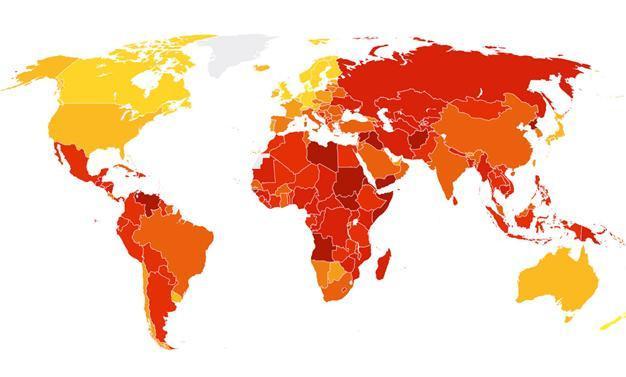Turkey ranks 75th in corruption perceptions index amid continued downfall
ISTANBUL
 Turkey has ranked 75th in Transparency International’s Corruption Perceptions Index 2016, falling nine places from 2015 and adding to its dramatic decline over the past four years.
Turkey has ranked 75th in Transparency International’s Corruption Perceptions Index 2016, falling nine places from 2015 and adding to its dramatic decline over the past four years.According to the results, Turkey scored 41 in the index, a one-point decrease from 42 in 2015. It shared the 75th rank with Bulgaria, Kuwait and Tunisia, decreasing from its 66th rank in 2015.
Among G-20 countries, Turkey also continued to decrease, down to 13th from 10th in 2014 and 12th in 2015.
Oya Özarslan, the head of Transparency International’s Turkey branch, stated that Turkey’s decreasing rank was caused by the government’s stagnating efforts in the fight against the corruption, disregarding of the warnings of national and international institutions on the issue, further distancing itself from the mentality of transparency and inclusive administration, and institutional erosion.
Özarslan noted that the antidote to corruption was a “fully constitutional state” with powerful institutions and mechanisms operating with the separation of powers and robust checks and balances.
A number of countries that ranked behind Turkey in previous years also outpaced the country in 2016.
In 2016 results, Denmark ranked as the top country on the index with a score of 90, followed by New Zealand and Finland.
The lowest ranking countries, meanwhile, were North Korea, South Sudan and Somalia with scores of 12, 11 and 10 respectively.
“This year’s results highlight the connection between corruption and inequality, which feed off each other to create a vicious circle between corruption, unequal distribution of power in society, and unequal distribution of wealth,” the survey stated, adding that over two-thirds of the 176 countries fell below the midpoint of the scale of 0 (highly corrupt) to 100 (very clean).
“More countries declined than improved in this year’s results, showing the urgent need for committed action to thwart corruption,” it added.
According to the regional analysis for Europe and Central Asia, the survey noted that “in many countries of the region, insufficient accountability has generated a perception of quasi-impunity of political elites, and the current wave of populism over Europe seems to enable legalization of corruption and clientelism, feeding the extreme power of wealthy individuals that steer or own the decision making power.”
















